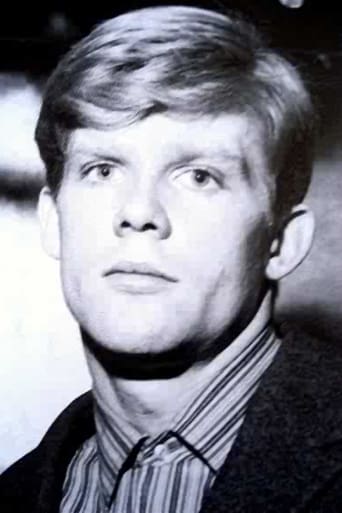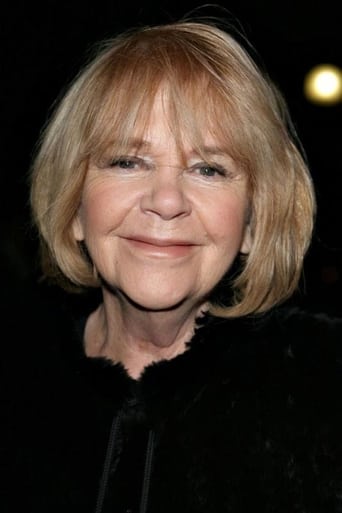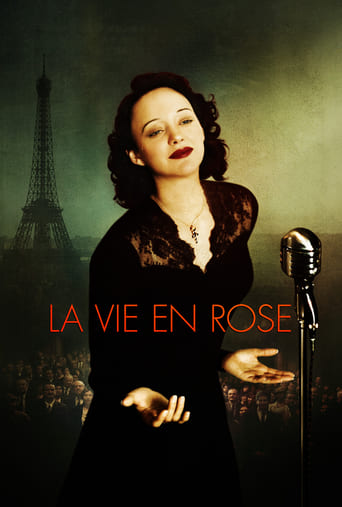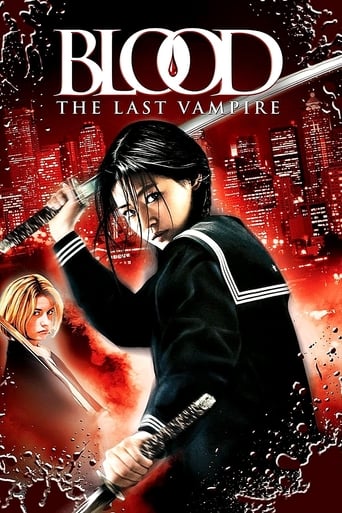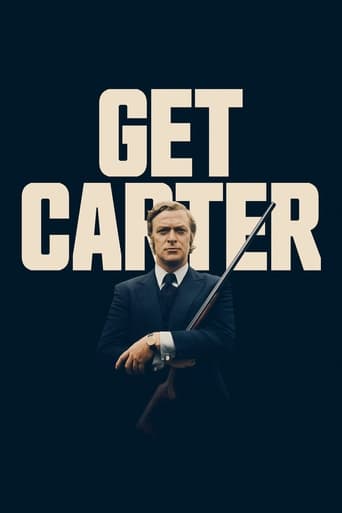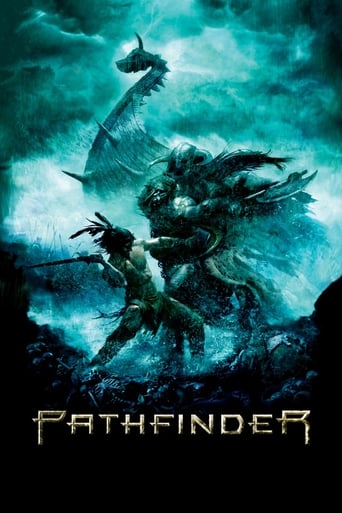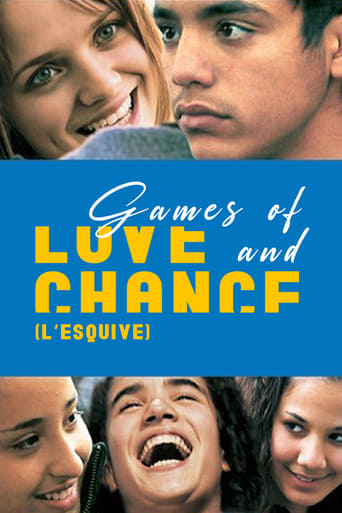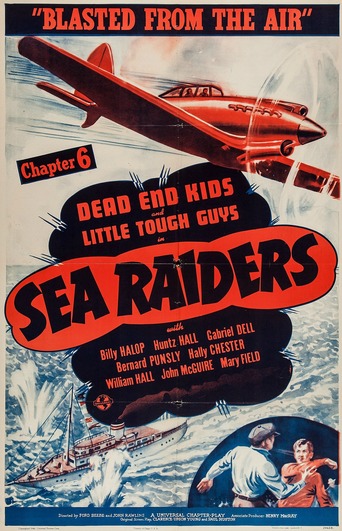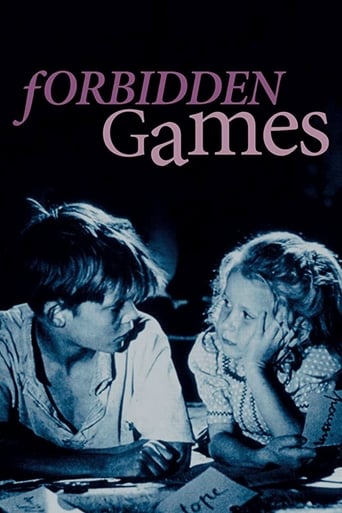
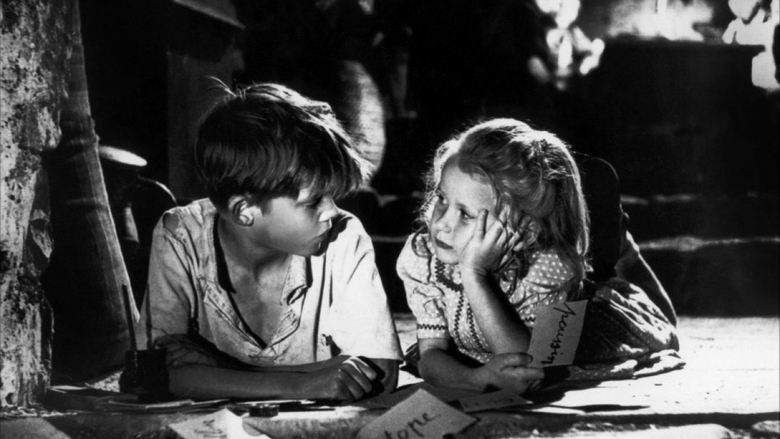
Forbidden Games (1952)
Orphaned after a Nazi air raid, Paulette, a young Parisian girl, runs into Michel, an older peasant boy, and the two quickly become close. Together, they try to make sense of the chaotic and crumbling world around them, attempting to cope with death as they create a burial ground for Paulette's deceased pet dog. Eventually, however, Paulette's stay with Michel's family is threatened by the harsh realities of wartime.
Watch Trailer
Cast
Similar titles
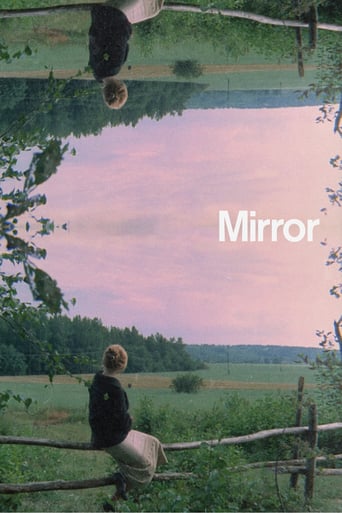
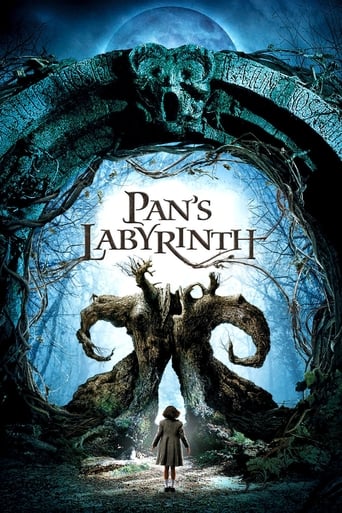
Reviews
Excellent, Without a doubt!!
Absolutely Fantastic
Fun premise, good actors, bad writing. This film seemed to have potential at the beginning but it quickly devolves into a trite action film. Ultimately it's very boring.
This movie feels like it was made purely to piss off people who want good shows
June 1950, the parents of a five-year-old girl Paulette (Fossey) are killed in a sudden strafe as they are fleeing from Paris during the Fall of France, death befalls her so wantonly, even her puppy cannot survive it. Then Paulette runs into Michel Dollé (Poujouly), a boy slightly older than her, who brings her to their rural home, a household of eight, the Dollé family takes her in, despite of the wartime difficulties.Paulette has a new home, but she is shell-shocked, what the hell can a little girl do to process the after-effects of death at such an innocent age? Director René Clément's Golden Lion champion pluckily grapples with this delicate matter in question postulated by François Boyer's source novel, it is more complex than a deviant orbit caused by children's innocence loss or juvenile blind faith (the latter would get a nice exploration in Bryan Forbes' WHISTLE DOWN THE WIND 1961). Paulette becomes fixated on the ritual after death ever since she tries digging a hole to bury her dead puppy and proffering something more orthodox to ensure a solemn promise of rest-in-peace, one thing after another, she needs other dead animals to be interred nearby for company, with Michel gladly offering his helping hand, their "pet cemetery" project goes rather smoothly, the last thing they need is crosses, and there is only one place can meet their requirement - the church cemetery.Does it sound morbid? On paper, yes, the psychological transference of a child's unhealthy obsession, which trespasses innocence and is fomented by the underdeveloped intelligence, can be reckoned as a fervent anti-war manifesto, children should never be afflicted with the cruelty of war, at any rate, that lies the meat of the film's enduring value and universal cachet. A sharp reference can be traced from the depiction of the feud between the Dollés and their neighbor, the Gouards, men are innately belligerent, and the film also shows that how shockingly easy to catalyze hostility into action even by blatant lies.Clément's spanking execution guile-fully hedges around most of the animal cruelty - save the unfortunate fate of Paulette's fox terrier, and the film itself is an absolute marvel, organically endearing and enormously poignant, Fossey and Poujouly are plain wunderkinds in front of camera, both in their first screen roles, completely tug at audience's heartstrings, in particular, their respective final scenes. It is a boy's rite-of-passage to face the vagaries of the adult world versus a girl's new chapter with her abruptly orphaned identity which chanciness beckons. But on a brighter side, love is cherished and celebrated in its purest form. Narciso Yepes' pellucid score turns mellow and romantic whenever the two kids are in the same frame, including the ear-worm takeaway, the guitar piece ROMANCE.Clément also garnishes the two leads with a rosary of subplots about the adults, each member of the Dollés is allotted with economic but well-crafted quota to reveal an authentic immediacy of life under that particular cloud, anxiety, dissatisfaction, sexual awakening and increasingly religiously dependent. To put it in a simple sentence, FORBIDDEN GAMES is a chef-d'oeuvre and one of the most important movies every human being on earth needs to watch and be affected, stunned and amazed!
I'm still crying my eyes out after watching this thing. Usually, I hate movies with children as the main characters. This is something else entirely - a simple tale with the most powerful antiwar statement imaginable. No pretense or preachiness, the filmmakers let the message come across seemingly by default. How skillful is that? And those two children!! Have you ever seen such convincing performances from anyone? This is a heartbreaker from start to finish, but along the way it's fraught with positive insights, even glints of humor. What a remarkable achievement to make such a profoundly shattering point and disguise it as entertainment! Truly unlike anything I've ever seen. Even the abrupt ending makes perfect sense - what more can you say after all that's transpired? This film just shot to the top of my all time favorite list.
Paulette is a six-year-old blond girl who, with her parents and her little dog, are part of a stream of refugees fleeing the advancing Germans early in World War II. The crowd is bombed and strafed and Paulette wanders off, an orphan, with her dead dog in her arms.She is taken in by a family of farmers with rather rudimentary values. They're plain spoken sons of the soil and they give her a bed (over the protests of one of the sons whose blankets are being appropriated) and treat her casually as one of the family.Paulette befriends Michel, the son who is a few years older than she. He suggests they bury her dog, already in rigor. But why?, asks Paulette. Well, it keeps him out of the rain. But won't he be lonely? Well, we'll get him some company. And they begin collecting small dead animals and burying them in the secret animal cemetery they've created. But they need crosses to put on the graves. Why? Well, that's the way it's done. So they begin stealing crosses from all over the place -- including the church and the cemetery. This leads to an uproar which is resolved by the police, who show up and politely take Paulette off to an orphanage. But all Paulette wants is to return to Michel.It may sound like a tear jerker but it's rather more than that. Paulette knows nothing of death, and Michel hardly more. He mistakes the rituals -- the prayers, the icons, the graves -- for the thing behind the rituals.For that matter, the adults seem to miss the point as well. One of the older sons has been run over by a horse-drawn cart and it takes him several days to die in his bed. He's not ignored. Michel reads the newspaper to him. But his condition and his future are treated casually, as if it were an everyday, humdrum events. "Look, he's spitting up blood now. We'll have to wash the sheets." The father misses the funeral mass because he's distracted by a loose board in the floor of the hearse and is busy fixing it outside the door.And when the crosses begin to disappear, the father accuses a neighboring family of stealing them and a comic fist fight follows. In the middle of the most brutal war in human history, a war in which tens of millions will be slaughtered, two simple-minded men are battling each other over mutual accusations which are both trivial and false.I'm not certain about the end. I don't really know that Paulette has learned very much about death, it's moral significance or its utter permanence. And I don't know that Michel's view of the world is any more sophisticated. But the incongruity between these petty gripes and insect deaths on the one hand and the historical reality of their situation holds the film together.The dead little dog aside, it's a moving film.
The wounds of the war weren't hailed yet that René Clement decided, in 1952, to revisit its traumatic experience and one of France's darkest periods, which started on the gloomy and disastrous year of 1940. It took a tremendous courage to make a film on such a painful subject, but "Forbidden Games" explores the War with an originality that would put it among the most poignant and universal movies ever made: children's point of view. And the way, these children perceive such terrible things like war and death is the humanistic and inspirational message, the film delivers to humanity."Forbidden Games" is an extraordinary immersion into childhood, our own childhood. And while watching the film. I was asking myself many questions such as: 'What if I lived during War?' 'What if I had encountered death as a child?' etc. The movie speaks for all these innocent children who had to live during troubled days, where death was as casual as life. Indeed, René Clement decided to make this film after having seen a documentary where a little Chinese girl was standing alone in field after the destruction of a village. This haunting image convinced him to make a tribute for the precocious bravery that inhabited those little hearts.So, the movie follows the small steps of Paulette, played by a five-year old Brigitte Fossey in a moving child performance that reminded me of Jackie Coogan in Chaplin's "Kid". She's like a little angel lost in a world of barbarity and cruelty. Her innocence indirectly caused her parents' death: by trying to protect her dog, she got exposed to the Nazi attacks and get her parents taking the bullets for her, War's absurdity is directly highlighted by the death of the dog that made the parents' sacrifice even more pointless. But this death will be the pivotal point that will put Paulette in Michel's path. Michel, a twelve-year old kid played by George Poujouly, who left this world too soon, in 2000.The new little orphan, Paulette, is accepted within Michel's family, the Dolles. The rural setting of the film could have made us forget about the war if it wasn't for death's omnipresence. Death's shadow haunts the Dolles' house with an implacable imminence after one of the father's sons, George, a jovial fellow, is stamped by a frightened horse during the same attacks that killed Paulette's parents. Ironically, it's the event that would lead Michel to meet Paulette. Their encounter was provoked by two fatal accidents, as if death was already the protagonist that would build their complicity. I don't mean to make this movie morbid, but just to assess that this is a mature film that deals with the innocence of childhood in a powerful way precisely because the theme of the movie is particularly dark.But this is not a sinister movie in its general mood, it's even punctuated by some comedic moments involving the rivalry with the neighbors, the Gouards and the father's temper. The movie's more general tone is serious, melancholic and profoundly nostalgic. This nostalgia feeling is perfectly embodied by the legendary music of Narcisco Yepes, one of the most beautiful scores ever. Or maybe romantic, considering the many love undertones between Paulette and Michel, his guardian angel with an angel face. They love each other because together, they manage to construct a world through war, a world that started from the idea of burying a grave for Paulette's dead dog.Paulette experienced death from the bombings that killed her parents; she almost learned to perceive death by an instinctive touching of the cheek. It's like she grabbed the concept of life ending, and if she took her dog with her and didn't seem to care for his parents, it's probably because of the dog's spasmodic movements that fooled her as an illusion of life. Besides, the idea of burying dead creatures satisfies Paulette, as if it was a way to exorcise all the fears that War could inspire. Death is not a danger anymore, almost a privilege. And the game that Paulette and Michel invent consist on burying dead animals and constructing a cemetery entirely dedicated to them. They try to domesticate the frightening specter of death, and make it more convenient for children's minds. We all simulated the adult world through our childhood games, playing the teacher, Dad and Mom or the doctor, so naturally, children during the War, played with death, and religion as if War was the likeliest time to underline the futility of belief, because war itself, is like the abdication of any humanistic or universal belief, a very mature film, indeed.Brigitte Fossey herself, said in an interview that it was a film meant for adults. Because it shows how children could also be cruel by inflicting death to more fragile creatures just to imitate the adult world, like when Michel kills the cock-roach suddenly provoking Paulette's crying. As much as she was used to death, she couldn't stand the act of killing, which reassures us about her innocence's preservation. Death can be playful, but killing is another matter. Life is still sacred for this poor little soul. And this is why I disagree with Fossey: yes, it's a film for adults, or older children, but again, it's also an inspirational movie about the power of imagination as the children's only weapon to face death and War. Children are still children, even during War And this is a movie that helps us to rediscover the magic of our own childhoods, our first little romances, our little games, all these things that start with 'little', and to let our hearts beat of joy and our tears running on our faces, driven by this beautiful music, the purest expression of a lyric innocence, victorious over the brutality and insanity of war

